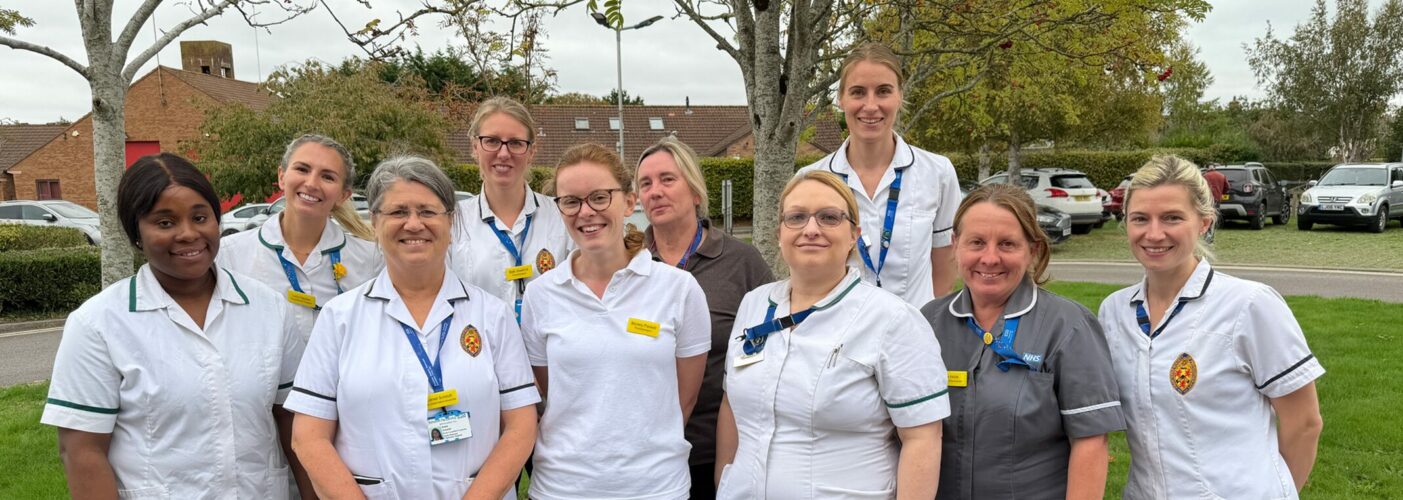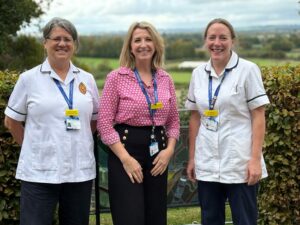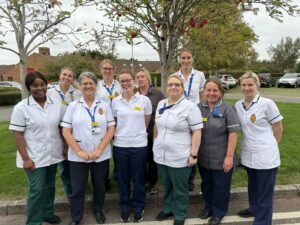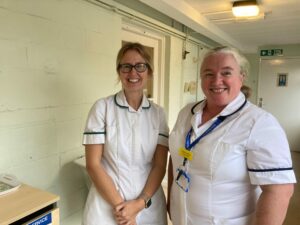
Spotlight
World Stroke Day 2025: a spotlight on our integrated community stroke service
Across the trust we have many different services that provide care for people who’ve had a stroke, from our acute hospitals and stroke rehab units, to our community and home services.
We’ll be covering the work of all our stroke services over the coming months, but this week we look at the care provided by colleagues in our integrated community stroke service.
The team works out of three main hubs – the community hospitals at Shepton Mallet, South Petherton and Williton – with a team of colleagues from different healthcare disciplines visiting patients in their place of home.
Between 1,100 and 1,200 people in Somerset have a stroke every year and some of those who can’t go straight home from hospital will be cared for at our community hospital stroke rehabilitation units, before they’re medically well, and also to see what functions they are still capable of.
 Janet Schmitt, a consultant practitioner for stroke, works across the whole of Somerset, principally with our community teams, but also the inpatient teams too.
Janet Schmitt, a consultant practitioner for stroke, works across the whole of Somerset, principally with our community teams, but also the inpatient teams too.
She explains how patients come into our integrated community stroke service. “When somebody has a stroke, they usually go into one of our acute hospitals (MPH or YDH) for a scan,” she says.
“They often need to be seen by the acute stroke unit team, so they’ll stay in hospital while they’re helped to become medically stable, where they’re prescribed all the appropriate medication.
“Then, as soon as the patient is medically-ready, they come out to either Williton or South Petherton hospitals, where we have 35 stroke rehabilitation beds between them.
“At least three quarters of people who’ve had a stroke need rehabilitation, which means around 900 people a year come through our service.”
Janet is mostly involved with our integrated community stroke service, which can see people either in their own home, or in a nursing/residential home – wherever they’ve been discharged to from a hospital inpatient stay.
“I’ve worked in the service for the last five years and the biggest change I’ve seen is patients’ length of stay in hospital, which is getting shorter all the time – definitely a good thing.
“We work with people who’ve had a stroke who want to reach a goal,” she adds. It could be that the stroke has affected their speech or swallowing, for example, so they’ll work with a speech and language therapist and others to regain what they can in speaking and swallowing.
“Similarly, it could be taking part in hobbies again, or getting back to work or driving, and they work with therapists to reach those goals.
“People often think it’s all about reaching those physical goals, as the stroke may mean somebody can’t move their arm or walk, and we do have physiotherapists who help with that.
“But we must remember that there are so many things with stroke that can affect any function, such as the brain, which can change the way somebody thinks or feels, or how they communicate.
“People tell us that they recover from their stroke better in their own environment, learning again about washing and dressing, or making a meal in their own environment that they’re familiar with, and having their friends and family around them.
“While our service does a fantastic job, we mustn’t forget how crucial the care that patients receive in our acute hospitals is, as that’s where people are diagnosed and then placed on the correct medication.
“If they have health issues like high blood pressure or atrial fibrillation, these will get spotted by our acute hospital colleagues, who will then manage them to help prevent another stroke. The early rehabilitation that happens in hospital is also crucial.”
 Hannah Watkins, a clinical specialist physiotherapist in the West Somerset based team, explains how the team in each area is made up of colleagues from many disciplines.
Hannah Watkins, a clinical specialist physiotherapist in the West Somerset based team, explains how the team in each area is made up of colleagues from many disciplines.
“We are a team of physiotherapists, occupational therapists, specialist stroke nurses, speech and language therapists, and rehabilitation assistants,” she says.
“We speak to our patients about the goals they want to achieve when they’re at home and we set their therapy plans around that. Some people can manage their exercises more independently, so our role is then more around reviewing them and upgrading their plans.
“The goals are variable as for one person it might be making flies for fishing, and for someone else it could be regaining some strength to more around their own home more easily.
“Every year we see increasing numbers of people who’ve had a stroke, and we’re sadly caring for greater numbers of younger people too.
“Patients tell us that they generally feel supported by our team, as it’s difficult to come home after any illness, but a stroke can turn someone’s life upside down, and we’re able to respond quickly so a lot of our patients will get a visit the next day if they need it.
“We get a daily update of all the patients who are coming out of hospital after a stroke, so we have to react quickly, and that includes providing that initial visit on top of those already on our caseload.
“We check that they have all the right equipment in place and that they can manage the essentials, and from there we plan their therapy based on what they want to work on.
“We end up developing a really good rapport with our patients, especially as for some we’re in their home multiple times a week, and sometimes we almost feel part of the family.
Bryony Puckett, a senior physiotherapist in the team, adds: “Our patients do feel like they have a lot more autonomy at home, as care can be so much more individualised than in hospital, and they have a lot more power to choose their own care.
“This is definitely the best team I’ve worked in during my career, as we are such a close and supporting group of colleagues who look after each other. That’s really important as we often have to be flexible, so good communication and team working can be vital.”
Helen Adams is one of the team’s Living Well After Stroke support workers., where she mainly carries out home visits or telephone reviews six months after a patient has had a stroke.
“I help our patients to get the best out of their life and focus on what they’re able to do, rather than them grieving for what they are no longer able to do.
“It’s devastating having a stroke at any age, but we’re seeing a lot more younger people, and for them it’s about coming to terms with a major life change and the impact on those around them.”
Jenny Williams, a nursing associate in the team, cares for patients who may need blood pressure checks or have type 2 diabetes.
“As part of my role, I’ll signpost or refer patients into different services, as well as contacting their GP about their medication,” she says.
“I cover the west part of Somerset with just under 200 patients on my caseload, and we also have an equivalent to me who covers the east, who has just under 300 on her caseload.
“It’s such a rewarding role as I see people at their worst and then when they become well, to their new normal, whatever that might be.”
Lucy Casson, a clinical specialist occupational therapist in the team, visits patients at home or on the ward at Williton Hospital.
“My role is realty varied as I also support our other OTs with their clinical practice, especially for complex patients, and I often get involved in service development too.
“As an OT I will work more on supporting patients with their cognition, returning to driving and work, vision, upper limb weakness, functional tasks, and helping people to be as independent as they can and work towards their goals.
“I love working for the team, especially caring for people of different age ranges, as there’s so much scope for people to improve after stroke.”
 Jess Hugall is an occupational therapist in the Mendip team, which was the first area to introduce early supported discharge from hospital for patients who’ve had a stroke.
Jess Hugall is an occupational therapist in the Mendip team, which was the first area to introduce early supported discharge from hospital for patients who’ve had a stroke.
“We came together pretty quickly as a new service, and we had a clear ambition of making a real difference to our patients, and the feedback we’ve had has been great,” she says.
“We try to help people live the best possible lives they can, by assessing them and working out how their stroke has affected them. We look at what we can do to improve or manage their situation to give them the best life possible.”
Sarah Laing, a physiotherapist in the Mendip team, adds: “As with the other areas in Somerset, we have a multidisciplinary team that includes OTs and physiotherapists, as well as our assistant practitioners, who see patients with less complex needs, and our therapy assistants.
“We work closely with our trust’s community rehabilitation service, especially if the patient is at risk of a fall, and we’ll refer someone on to them if they still need non stroke related rehab, such as help to walk to the local shop.”
Patient Albert Moore, 87, from Taunton, has been very active and strong throughout his life, having enjoyed careers in the Royal Navy for 12 years, and as a police officer for almost 30 years.
Speaking to us from Williton Hospital, where he was being cared for after a stay on Musgrove Park Hospital’s acute stroke unit, Albert explains how he ended up in hospital.
“I had never felt particularly unwell before, except experiencing a bit of giddiness a few times,” he says.
“One day I went to get a few bits from a kitchen cupboard, and my own weight made me fall onto the floor – hitting the doorframe and a chair in the process.”
Albert was admitted to hospital following his fall and a scan showed that he’d had a stroke. “I didn’t know what a stroke was and never thought it could happen to me,” he continues.
“After I was cared for on the stroke unit at Musgrove, I was transferred to Williton Hospital for rehab, and the care has been outstanding, with the food particularly excellent!
“The rehabilitation I’ve had in Williton has been superb, as when I first arrived I couldn’t even stand up and I’d lost my balance. My short term memory has been affected too.
“I’ve had some therapy at the hospital in the gym where I’ve done some hip exercises, and they have taught me how to go up the stairs again. They were very patient with me, and I can’t speak highly enough of all the staff I’ve come across at Williton Hospital.
“I’ll hopefully go home soon, and they’ve told me that physiotherapists and occupational therapists will come to my home to help me to recover, and they’ll also get things set up so I can safely manage at home.
“I’ve been married to my wife for 60 years and it has been an emotional time for her too…I can’t wait to get home!”

